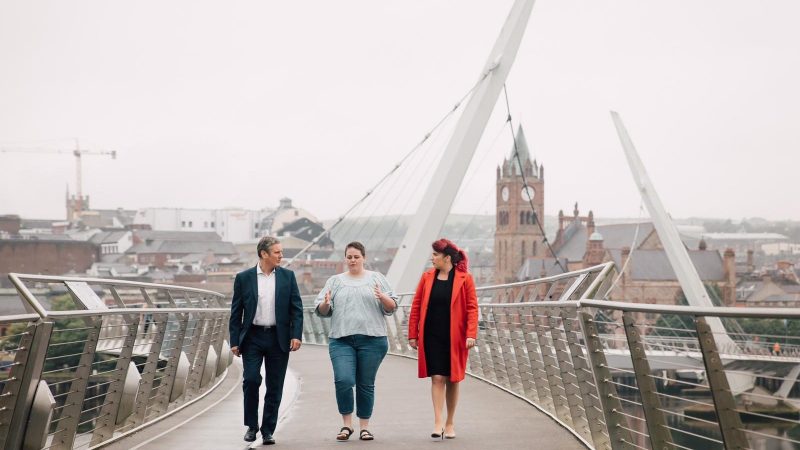
In the decade after the Good Friday agreement, I spent some of the most rewarding times of my career in Northern Ireland. My crucial task was to advise the Police Board of Northern Ireland as the Royal Ulster Constabulary was transformed into the Police Service of Northern Ireland.
Working in the institutions built by the Belfast/Good Friday Agreement, I saw what is possible when people pull together. As the late Mo Mowlam said: “It takes courage to push things forward.” The agreement was the sum total of the courage of the communities of the people of Northern Ireland.
Returning to Northern Ireland this week, I saw that same deep commitment. From the teachers, parents and children of Forge Integrated Primary School, building the shared future that the Agreement imagined.
And on the Peace Bridge in Derry/Londonderry, I was honoured to stand alongside Sara Canning, partner of murdered journalist Lyra McKee. Sara spoke so powerfully about reconciliation and equality and her campaign for justice must demonstrate that there is no going back, not now, not ever.
Yet it is clear that the peace process is fragile, perhaps now more than at any time since 1998, and we have a government failing in its duty of care.
It’s wrong to sign a treaty and now seem to want to disavow it. It’s wrong to be doing nothing to calm tensions especially at this most tense point of the calendar. And it’s wrong to propose an amnesty law that would deny justice for victims.
I know the importance of trust in Northern Ireland, and it is trust that Boris Johnson has undermined. I have heard loud and clear that communities there see a Prime Minister that has put his own narrow interest over the interests of the people and communities of Northern Ireland.
Northern Ireland cannot afford Boris Johnson’s failure. It has seen, in the brief period since our party helped co-author the Good Friday Agreement, a moment in which, in the famous words of Seamus Heaney, hope and history have rhymed. We cannot risk a return to the past and the loss of hope it will bring.
That Agreement was the sum total of the courage and determination of people from all corners and communities of Northern Ireland who sought a new beginning. It was negotiated and signed by political leaders, including the Labour government led by Tony Blair, and we are all rightly proud of Labour’s role in the signing of the Agreement.
But it was ultimately ratified by the people of Northern Ireland and the entire island of Ireland in concurrent referenda and with overwhelming support. They gave political leaders and governments across these islands an unequivocal instruction – one which is as strong today as it was then.
The genius of the Agreement was that it was unambiguous in saying that people in Northern Ireland can be Irish or British or both, and the Agreement makes it clear that it is for the people in Northern Ireland, and on the whole island of Ireland to determine their own future.
When it comes to the constitutional future of Northern Ireland, the Belfast/Good Friday Agreement is clear: that power rests with the people of the island of Ireland. This principle of consent is at the heart of the Belfast/Good Friday Agreement, and Labour’s commitment to that fundamental principle is, and always will be, unshakeable.
With trust fragile and huge challenges facing Northern Ireland, a Labour government I lead would renew our historic commitment to take forward the promise of peace, which has been allowed to stall over the past decade.
We would work as honest brokers and trusted partners with communities and parties across Northern Ireland, and the Irish government, to deliver on our role as a guarantor of the Belfast/Good Friday Agreement. And we’d play our part in responding to some of the profound, shared challenges we face across these islands, to help build the better future the Belfast/Good Friday Agreement dreamt of.
But in truth, what everyone in Northern Ireland needs now is a focus on how we come out of the pandemic and challenge the underlying inequalities it has exposed. That’s my task and that will be the focus of a Labour government. As Mo Mowlam said, “it’s the real life of people that needs changing”. The people of Northern Ireland deserve no less.




More from LabourList
‘As metro mayors gain power, Labour must tighten political accountability’
Letters to the Editor – week ending 22 February 2026
‘The coastal towns where young people have been left behind by Whitehall’